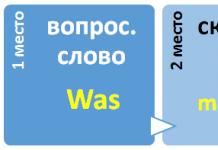The category of modality is an important link in the language system. Without it, speech would be devoid of many shades, sometimes of decisive importance. So, for example, English modal verbs and their equivalents in relation to the main action make it possible to express:
- possibilities;
- advice, assumptions;
- prohibitions;
- requests and permissions;
- necessity.
Agree, there is a difference between the expressions “ I'm writing a letter" And " I was forced to write a letter" The fundamental meaning of the phrase is the same - a person writes a letter, but the modal transmission of circumstances reveals the essence of the action in a completely different light. Today we will study representatives of the class of modal verbs, and also select synonyms for them.
To simplify the perception of information, we will distribute all modal verbs and their substitutes into significant categories.
Possibilities
The main exponent of physical, mental and other abilities to perform actions is the verb can, which is translated into Russian to mean “I can, I can.”
- We can speak Spanishwell– We speak Spanish well.
- It does not change either in numbers or in persons. In addition, can independently creates questions and denials.
- Can she write verses? – Can she write poetry?
- Mychildren can 't read yet– My children don’t know how to read yet.
In the past tense, the form could is also the same for everyone. Sometimes it is replaced with a similar meaning managed ( managed). But for the formation of the future they use to be able to ( be able to).
- NextyearI will be able to speak Polishfluently– Next year I will be able to speak Polish fluently.
Formal opportunities, requests and permissions
Formal possibilities, that is, possibilities associated with external circumstances, are expressed by may and its past form might. It is translated as “to be able”, but in a more abstract meaning, close to its synonym to be allowed to ( be allowed). That is, an action can be performed because circumstances, desires or opportunities have developed this way.
- We may play footballonFriday– We can play football on Friday.
You can often see may used in interrogative form as a request.
- Mom, may Jack visit us? – Mom, can Jack come visit us?
Accordingly, sentences with negations will express refusal.
- You may not use mycomputer– You cannot use my computer.
By the way, the English are increasingly using can in the request-prohibition function. But can and may are not capable of creating the context of the future, so in such situations the already mentioned tobeallowedto.
- Our company will be allowed to start the building of cottages –Ourcompanieswill allowbeginconstructionthesecottages.
The largest group, the meanings of which are reflected by many modal verbs and their equivalents. Moreover, each representative has a special semantic nuance.
The modal verb must is responsible for categorical necessity. It expresses an obligation determined by a person for himself independently, i.e. This is not external pressure, but decision-making based on personal motives and principles.
- I must go home- I have to go home.
In the negative form, this verb plays the role of a strict prohibition, almost a command.
- You mustn 't talk thatwaywithyourparents. “You shouldn’t talk to your parents in that tone.”
Must is the same for all persons, but does not form the future and past tenses. It is replaced by the verb of obligation have to. Its main purpose is to indicate the forced necessity of performing an action, i.e. to pressure from the outside.
- We had to make thereportyesterday– We should have made this report yesterday.
In the present tense, the verb have to has two forms: for the 3rd person singular. – has, for everyone else – have. Questions and negatives are constructed using the auxiliary do.
- She has to go to the office on Saturday –SheforcedgoVofficeVSaturday.
- Do I have to make this report? –Imustdothisreport?
Both verbs are also used to express assumptions, but must is used in this role much more often than have to. In the Russian translation this meaning is expressed by the introductory combination “ there must be».
- It must be true- This must be true.
If necessity and duty arose as a result of a preliminary agreement, then another equivalent comes into play - the verb to be to. It changes in numbers and persons, and expresses the meaning “must, must” (since this was discussed in advance).
- The driver is to meet you at 3 o’clock –The driver mustmeetyouat 3hours.
This form can be used in the past and future tense. Moreover, in the construction of the future, to be is replaced by have.
- The guide will have to meet this delegation next Monday –The guide is scheduled to meet this delegation next Monday.
The weakest degree of duty and necessity, maneuvering on the verge of urgent advice and moral obligation, is expressed by the verbs should to and ought to. They have one form, so they are used only in the present tense.
- You ought to help your little brother –Youshouldto helpyoungerbrother
Sometimes necessity is expressed with the verb need to. He forms all tenses, but builds questions and negations with the help of the auxiliary do.
- I don’t need to go to the shop –To meNotneed togoVshop.
Modal verbs and their equivalents in the summary table
We will try to summarize the knowledge we have acquired, using a table of modal verbs in English and their analogues to help us.
| Modal verbs | |||
| Verb | Present | Past | Future |
| Can
Possibility, skill, ability |
can
am/are/is able to He can't (is able to) build a house. He can (able) build a house. |
could
managed to was/were able to He couldn't (was able to/managed to) build a house. He could (was able/he succeeded) build a house. |
will be able to
He will be able to build a house. He can build a house. |
| May
Formal opportunity, please |
may
am/are/is allowed to She may (is allowed to) go to the concert. She can (she was allowed) to go to a concert. |
might
was/were allowed to She might (was allowed to) go to the concert. She could (she was allowed) to go to a concert. |
will be allowed to
She will be allowed to go to the concert. She will be allowed to go to the concert. |
| Must | must
We must pay for the tickets. We have to pay for the tickets. |
had to
We had to pay for the tickets. We should have (were forced) pay for tickets. |
will have to
We will have to pay for the tickets. We will pay (we will have to pay) tickets. |
| Have to
Forced necessity |
has/have to
We have to pay for the tickets. We are forced to pay for the tickets. |
||
| To be
Obligations by agreement |
am/are/is to
We are to pay for the tickets. We are required to pay for the tickets. (there was such an agreement) |
was/were
We were to pay for the tickets. We had to pay for the tickets. |
|
| Ought to
Moral duty |
ought to
You ought to marry Pamela. You should marry Pamela. |
||
| Should | should
She should be friendly to children. She should be nicer to children. |
||
| Need to
Need, need |
need to
I need to go to my parents. I need to go to my parents. |
needed to
I needed to go to my parents. I needed to go to my parents. |
will need to
I will need to go to my parents. I will need to go to my parents. |
Views: 328
There are no analogues of modal verbs in Russian. However, speaking English without using modal verbs is almost impossible. It is recommended to start learning grammar by including them in the program.
Modal verbs need to be known like the multiplication tables, as this is considered Elementary English.
Modal verbs are not used independently and do not denote a specific action, but reflect the speaker’s attitude to the action, i.e. modality. This is their secret - simplicity and complexity at the same time.
List of modal verbs and their equivalents
| Modal verb | Meaning | Equivalent |
| can | be able to, be able to, be able to | be able (to) |
| may | be able, have permission | be allowed to be permitted to |
| must | be to | have to be to |
| ought to | should, should (recommendation, advice, probability, assumption) | should had better |
| have to | forced, has to | must be to |
| be to | should (according to plan) | have to must |
| need | need (used to ask permission, or to give permission). | - |
| should | should, should (advice) | ought to be supposed to had better |
| would | want; probably; it happened | - |
| shall/will | offer of help, to do something / promise, intention, spontaneous decision at the moment of speech | should had better |
| dare | dare (dare to do something) | - |
| used to | description of an action or condition that occurred regularly in the past | - |
Interrogative and negative forms of modal verbs
- Modal verbs form interrogative and negative forms independently, without using the special verb “to do”. In this case, the modal verb is placed at the beginning of the sentence in the question.
Shall I help you?
Should I help you?
Could you give me his address, please?
Can you give me his address, please?
Non-finite forms, such as the infinitive, gerund and participle, are not inherent in modal verbs. Modal verbs lack complex tense forms and the imperative mood. For all persons and numbers, modal verbs use a single unchangeable form.
- Negative form modal verb is formed by placing the particle “not” after it. Often, especially in oral speech, they merge into an abbreviated form. In colloquial speech the following abbreviations are usually used in the negative form: cannot = can"t, could not = couldn't may not = mayn't, might not = mightn't must not = mustn"t, ought not = oughtn"t, need not = needn't.
You can't help him.
You can't help him.
She might not come here.
She couldn't (she didn't have permission) to come here.
These signs allow you to rely on modal verbs when studying. Having memorized a small number of modal verbs, the student has a chance to immediately construct simple sentences based only on simple verbs. And this is very important. You will already be able to express your opinion with only a fairly small number of words in your arsenal.
Verbs of obligation (must, have to)
The main verbs of obligation are “must” and “have to”. " Must» expresses necessity committing actions(usually according to some rule or law), as well as an order or advice. Translation: “should”, “need”, “must”. " Have to" talking about necessity committing actions under forced circumstances when you clearly don’t want to do something, but, as they say, “you have to.” Usually translated into Russian as " must», « forced», « have to».
I have to work overtime.
I have to work overtime (I don't want to, but I have to do it).
You mustn't smoke at the airport.
You can't smoke at the airport (that's the rule).
Requests (shall, will)
“Shall”, “will” are also called modal verbs in combination. With their help you can create future times. As soon as " shall", "will" appear in a sentence - this is a sure sign debt, necessity, order or even threats. « Will"means a desire or intention, a polite request.
I want to come in. Shall I open the door?
I want to come in. I probably (should) open the door?
Will do you give me the ketchup?
Can you pass me the ketchup?
These verbs are original transmitters of the desired form of modality, and not only can form the future tense.

It is recommended to remember that after modal verbs, in addition to the verbs “ought to”, “have (got) to” and “be to”, an infinitive without the particle “to” is used. It is also called bare infinitive.
I must go.
I have to go.
Verb " ought to"is an obligatory verb. But unlike " must", which means must in connection with the requirements of rules, laws, authorities, "ought to" means obligated due to moral obligations. It's such a subtle difference. For example:
You ought to visit your parents more often.
Visit your parents more often.
You must keep the law.
Follow the laws.
Possibility, probability (can, may, must, might)
Most often, modal verbs “can”, “must”, “may” are used in this meaning. These are verbs of general meaning with the ability to replace other modal verbs. Modal verb " can" - the most popular. The usual translation into Russian is “to be able”, an expression of skill and ability to do something. For example:
I can help you.
I can help you.
The verb "can" is in the past tense " could" For example:
She could dance beautifully when she was young.
She could dance beautifully when she was young.
Modal verb " must", like "can", is used very often in speech. It is important to remember that in addition to its primary meaning - “to be due”, it is also used when we talk about the likelihood that something has happened. And this probability borders on certainty. For example:
I phoned, but nobody answered - they must be at work.
I called, but no one answered - they must be at work (i.e. I'm pretty sure of it).
Modal verb " may" has two main meanings: resolution and probability. Past tense form - " might" For example:
May I come in?
Can I come in? (Permission).
I might have taken only three seconds to show it to you.
It might only take me 3 seconds to show you this.
But " might» can also be used completely independently, meaning “possibly”. If we compare “may” and “might”, then in the case of the latter something may happen, but it is unlikely; if you say " may“—then the probability is greater. For example:
The sky is gray - it may rain today. They might come, but I don’t think so.
Past tense (Perfect Infinitive)
Perfect Infinitive, along with other infinitives, has no analogues in Russian. In speech it is used according to the following formula: have + 3rd form of the verb. Since most verbs do not have a past tense form, we use the Perfect Infinitive to show that something happened in the past. For example:
You should have called me yesterday.
You should have called me yesterday.

Passive voice with modal verbs
When we change a sentence from "active" to "passive", we must change the predicate of the sentence.
First, you need to put the verb “ to be” at the same time as used in the main sentence. Secondly, put the main verb in third form(Past Participle).
So, to compose a sentence with a modal verb, we need to put the verb to be in combination with the modal verb. It will look like this:
must be(it should be);
have to be(it should be);
ought to be(should be);
can be(May be);
should be(should be);
be supposed to be(it is believed that; it is assumed that;)
The secretary must write a letter. / The secretary must write a letter.
The letter must be written by the secretary. / The letter must be written by a secretary.
He has to do this test. / He must perform this test.
This test has to be done by him. / This test must be performed by him.
He was supposed to send an email an hour ago. / He was supposed to send the letter an hour ago.
The email was supposed to be sent by him an hour ago. / The email was supposed to be sent an hour ago.
Features of modal verbs
- Does not have a 3rd person singular present tense, that is, they are not placed with “-s” at the end.
- No infinitive, ing form and participle; never answer the question of what to do / what to do?
- They only require the form after themselves " Infinitive» without particle « to" (exception - " ought to», « have(got) to" And " be to"). I must go.
- Interrogative And negative forms proposals are constructed without an auxiliary verb « do", with the exception of the verb " have to».
- Verbs " have», « be», « should"can be not only modal, but also auxiliary, and the verbs " need», « have», « be», « get" - also semantic.
- According to their properties, English modal verbs, except “ have to», « have got to», « be to», « dare"are insufficient, that is do not have personal forms, and in connection with this do not form complex verb forms.
What does turnover mean: be supposed to and had better
The phrase “be supposed to” means that someone or something is expected to perform some action. If we select the Russian equivalent, the closest expressions are like: “in theory it should”, “as if it should”, “it is implied that it should”. It happens in the present (am / is / are) and past (was/were) tenses.
“Be supposed to” - rather than expressing an obligation, it expresses the expectation of performing some action.
I am supposed to obey my lord.
In theory, I should obey my master (but in reality I don’t obey that much).
I am supposed to do my duty.
I must do my duty (but if I don’t do it, no one will notice).
Excuse me, you are not supposed to …
Sorry, but you can't...
“You are not supposed to” is a polite way to tell someone not to do something or to let them know they shouldn’t do it.
With turnover " had better“almost the same situation, only he expresses recommendation, desperation, warnings or threats. The modal verbs “ought to” and “shall” can be equivalent. Happens only in past form.
You had better take your umbrella with you today.
Today you better take an umbrella with you. (Expresses a recommendation.)
That bus had better get here soon!
I wish this bus would come sooner! (Expresses despair.)
You'd better not talk the way you talk to me in the future!
From now on, you better watch how you talk to me! (Expresses a warning, a threat.)
Modal verbs in indirect speech
Similar to tenses, modal verbs change in indirect speech if the words being conveyed are no longer true or are out of date.
Direct speech: can, may, will, must.
Indirect speech: could, might, would, had to.
Peter: "I can stay here until Sunday."
Peter: "I can stay here until Sunday."
He said that he could stay there until Sunday.
He said he could stay there until Sunday.
Dan: "You may don't need this"
Dan: “You might not need it.”
He said I might don't need that.
He said I might not need it.
Kelly: "My dad won't let me go to the party."
Kelly: "My dad won't let me go to the party."
She said that her father wouldn't let her go to the party.
She said her dad would let her go to the party.
Luke: "We must leave at 8 o"clock."
Luke: "We have to leave at 8 o'clock."
He said we had to leave at 8 o"clock.
He said we had to leave at 8 o'clock.

Using modal verbs with the perfect infinitive
Modal verbs can be used in combination with the perfect form of the infinitive, also called the modal perfect ( modal perfect). At the same time, the semantic load of the perfect infinitive has different meanings and depends on the specific modal verb and context.
The use of the modal perfect can name an action in the past, an unreal action, the degree of confidence in a certain action, and can also indicate that the opposite of the expected action took place.
Formula: modal verb + have + V3.
After modal verbs, the verb " have", forming a perfect infinitive, is pronounced in a reduced form:
They must have gone away already. ["mʌst"əv] - They must have already left.
In negative and interrogative sentences, the modal verb " can", used with the perfect infinitive, conveys disbelief into an action or event, past:
She can't have overslept. She is never late.
She couldn't sleep. She is never late.
- Could. The verb group (“could” + perfect infinitive) can be used with a meaning similar to “can”, but expresses a less categorical form:
I don't believe he could have done it. He is too weak.
I can't believe he could do this. He's too weak.
I didn't believe he could have done it. He was too weak.
I didn't believe he could do this. He was too weak.
Also, the perfect form of the verb is used with the modal verb “could” to indicate an action that could have happened, but did not happen:
We could have gone, but we didn't.
We could have left, but we didn't.
- May. The use of the modal verb may in combination with the perfect infinitive expresses assumption, uncertainty in what happened:
She may not have known about it. But it doesn't constitute justification.
She may not have known about it. But this is no excuse.
I"m not sure but he may have been here.
I'm not sure, but he could be here.
- Might. The use of the past tense form of the verb may indicates less likely to act or events:
Don't be angry with her. She might not have known about it.
Don't be mad at her. She may not have known about it.

- Must. This modal verb with a perfect infinitive indicates the certainty or high probability of an action occurring in the past and relevant to the present moment:
I figured I must have hurt the muscle while playing.
I think I must have injured a muscle while playing.
I can't find the keys. I mustn't have taken them.
I can't find the keys. I probably didn't take them.
- Need. In combination with a perfect infinitive, it expresses doubt about the appropriateness of an action performed in the past; it is used only in interrogative and negative sentences:
Need have you done it?
And what was the need for you to do this?
He needn't have been present all the time.
He didn't need to be there all this time. (There was no need).
- Ought. Expresses censure, reproach for what was not done or was done incorrectly:
You ought to have done it previously.
You should have done this earlier.
- Will. Used to express determination, desires or the intention to perform an action that must be completed before a certain time in the future or before the beginning of another action:
I won't have done it by the time you get back.
I (not finish) will not do this by the time you arrive.
- Would. Used to express desired subject of action, but which didn't happen:
I wouldn't have done it. But I was so young.
I didn't want to do this. But then I was still so young.
I would have come, but I got stuck in traffic.
I would have come, but I was stuck in traffic.

Conclusion
Modal verbs are easy to learn and understand, since they have many similarities with the native Russian language. Although there are some differences. In any case, they will be a good help in moving forward for anyone who wants to improve their knowledge of the English language.
Big and friendly EnglishDom family
Modal verbs are verbs that denote not the action itself, but the speaker’s attitude towards it.
I must come and see my parents next Sunday. I have to visit my parents next Sunday.
He can speak three languages. He can speak three languages.
Modal verbs in English do not have an infinitive form, impersonal forms in -ed, -ing, don't accept the ending -s, -es in the 3rd person singular Present Indefinite, i.e. do not conjugate. They form interrogative and negative forms without an auxiliary verb. After modal verbs, the infinitive of another verb is used without a particle to(exception verb ought to).
Shall, should
Verb shall expresses a promise, intention, threat, warning.
He shall get his money. He will receive your money.
The child shall be punished for it. Child will be punished for that.
Verb shall also expresses a request for further action.
Shall we begin? Should we start?
Verb should mainly used to express urgent advice, recommendations.
You should see a doctor. You should see a doctor.
Must
Verb must used:
To express obligation, the need to perform an action in the present or future.
I must go. To me necessary go.
To express prohibition in a negative sentence.
You mustn't do it. It is forbidden do this.
To express the probability of some action or assumption.
He must have read this book. He, probably, read this book.
You must come and see my new flat. You must come see our new apartment.
to have (to)
Verb to have (to) used in combination with an infinitive with the particle to to express the need to perform an action due to certain circumstances. Corresponds to Russian “have to, had to”.
to be + Infinitive
Verb combination to be with an infinitive it is used to express the need to perform an action in accordance with a previous agreement or a pre-planned plan. Translated as “must, should have,” etc.
I was to meet her at 3 o"clock. I must was to meet her at 3 o'clock.
They are to begin this work at once. They must start working immediately.
May, might
May, might
This modal verb has two forms: may- for the present tense, might- for the past. The verb may is used to express:
Permissions in affirmative and interrogative sentences.
You may go.
You can go.
May I help you? Allow me can I help you.
Prohibitions in negative sentences.
Assumptions, uncertainties in affirmative and negative sentences.
It may rain today. Maybe It will be rain today.
The verb might is used:
In subordinate clauses in accordance with the rule of tense agreement.
She said that he might take her book. She said he Maybe take her book.
To indicate the probability of an action occurring.
He might come. He, May be, will come.
to be allowed to
to be permitted to
Collocations to be allowed And to be permitted+ infinitive with particle to are synonyms for modal verb may(see point 1).
I am allowed to use this device. To me allowed (I can) use this device.
He will be allowed to use this device. To him will be allowed.
must
Verb must used:
To express obligation, the need to perform an action in the present or future.
I must go. To me necessary go.
To express prohibition in a negative sentence.
You mustn't do it. It is forbidden do this.
To express the probability of some action or assumption.
He must have read this book. He, probably, read this book.
to denote urgent advice, recommendation.
You must come and see my new flat. You must come see our new apartment.
to have (to)
Verb to have (to) used in combination with an infinitive with the particle to to express the need to perform an action due to certain circumstances. Corresponds to Russian “have to, had to”.
to be + Infinitive
Verb combination to be with an infinitive it is used to express the need to perform an action in accordance with a previous agreement or a pre-planned plan. Translated as “must, should have,” etc.
I was to meet her at 3 o"clock. I must was to meet her at 3 o'clock.
They are to begin this work at once. They must start working immediately.
Can, could
Can, could
This modal verb has two forms: can - for the present tense, could - for the past. It is used:
To express the possibility or ability to perform an action. In this meaning it is translated as “to be able”, “to be able to”.
She can speak English well but she can't write it at all. She Maybe (can) speaks English well, but cannot write at all.
To express permission to perform an action (in interrogative and affirmative sentences).
Can we go home? Can should we go?
Yes, you can go.
Yes you you can go.
To express a prohibition to perform an action, expressed by an infinitive (only in negative sentences).
He will be able to help you. He will be able help you.
If you're learning English from scratch, be prepared to learn a radically different system of verbs. The English tense system and reading rules are very different from Russian. Quite often, beginners in learning, when faced with the first difficulties, give up. Nevertheless, the rules of English grammar are quite easy to understand.

Modal verbs
A modal verb is a special unit in the English language that is subject to a separate rule. There are several types of verbs in English: regular, irregular, modal. The list of irregular verbs is separate; you need to know it by heart. Regular and irregular verbs differ from each other in the way they form the past tense. Regular verbs form past tense forms by adding irregular verbs change their form completely. In addition, verbs are divided into main and auxiliary. The main ones have a lexical function and denote a specific action. Such verbs are translated into Russian. Auxiliary verbs exist only in pairs with main verbs and have a grammatical function. These verbs have no translation into Russian. Modal verbs in English have an additional function in relation to main verbs, which equates them in function to auxiliary verbs. They denote the relationship of the subject to the main action: obligation, need or ability to do something. That is, I must know or know how to swim, I can tell you, and so on.

Modal verbs: rules and examples
For comfortable language proficiency, you need to know the following list of modals must, may, need, ought to, should, have to, to be able to, manage to. As for the rules for using modal verbs, the basic principles are:
1) we do not add endings to modal verbs (with the exception of the modal verb manage to);
2) we do not put the particle to after modal verbs (except need, have to, ought to)
3) the main verb after the modal is placed in the infinitive form (initial form)
For example:
I need to go, it's late. I have to go, it's late.
You have to do this task till tomorrow evening. You must complete this task by tomorrow evening.
You ought to find another way. You should find another way out.
Students must follow university rules. Students must follow university rules.
My mother is very clever, she can speak five languages. My mother is very smart, she speaks five languages.

Modal verbs are similar in their meaning, but there are still some differences. Let's take a closer look.
Modal verb can/could
This modal verb is translated as “I can, I am able”; it can mean a skill or ability to do something. Can- present tense form, could- past tense form. If you use modal verbs according to the rule in the future tense, use the form of the modal verb to be able to - will be able to. For example:
I can swim very well, because I had very good teacher. I can swim very well because I had a good teacher.
I could see much better several years ago. A few years ago I saw much better.
We will be able to help you, explain the situation. We can help you, explain the situation.
According to the rules, the negative form of modal verbs is formed by adding not - can not, the abbreviated form can"t. For example:
I can't find my book in this mess. I can't find my book in this mess.
Could not, shortened form of couldn't. For example:
Students and pupils could be ready for this competition. Pupils and students could not prepare for this competition.
To formulate an interrogative sentence with a modal verb can/could you need to use reverse word order in the sentence, that is, put the modal verb first, not the subject. For example:
Can Mike take your shirt, his is dirty? Can Mike take your shirt, his is dirty?
Verb in interrogative form could has a polite connotation, you can use it to ask permission. For example:
Could you borrow me some salt? Can you lend me some salt?

Modal verbs to be able to/manage to
Another modal verb with the meaning “to be able to” to be able to. But if could has more general boundaries, then be able to is used in particular, specific situations. For example:
The fire spread very quickly, but everyone was able to escape. The fire spread very quickly, but everyone was able to escape.
We didn't know where is my cat, but finally we managed to find him. We didn't know where my cat was, but we were eventually able to find him.
Past form of the verb to be able to - was/were able to. Past form of the verb manage to - managed to.
To create an interrogative sentence, you need to put an auxiliary or modal verb first. For example:
Was she able to get out of the room without your help? Was she able to get out of the room without your help?
Who manage to beat the best player? Who can beat the best player?
To form a negative sentence, use the particle not or an auxiliary verb. For example:
I didn't manage to do this work without instructions. I couldn't do this job without instructions.
Modal verb must
The modal verb must expresses an extreme obligation. If you are learning English from scratch, you should know that you need to be careful with this verb, since it has a commanding meaning. When you want to give a recommendation rather than a command, you should choose a different verb. For example:
Pupils of our school must follow the Regulation. Students of our school must follow the Charter.
The modal verb must in the negative form means “is not obliged.” Formed by adding a negative particle not for example:
Your family must not move in another town if they don"t want to. Your family doesn't have to move to another city if they don't want to.
To form interrogative sentences, put must first place in the sentence.
Must the animals be kept in the cages? Should animals be kept in cages?
In addition, the verb must has another meaning. We say must be in the sense of “must be, probably.” For example:
You must be very hungry because you have missed the dinner. You must be very hungry because you missed lunch.
It must be very noisy to live in the center of such a big city. It must be very noisy living in the center of such a big city.

Modal verb may/might
May and might, like all modal verbs, according to the rule, complement the main verb. The translation of this verb is “maybe, it’s possible.” May is the present tense form, might is the past tense form. For example:
I may be one of the best students in this college. I can be the best student in college.
Where is my bag? It might be in your room. Where is my bag? She could be in your room.
He might be having lunch. He might have had lunch.
It is very strange explanation, but may be true. This is a very strange explanation, but it may be true.
To make a negative sentence, use the negative particle not - may not, might not.
It may not be truth! It can not be true!
An interrogative sentence is formed according to the general rule: put the modal verb in first place. For example:
May I open the windows, is it very hot? Can I open the window, it's very hot in here?

Modal to
It means "have to, should, must." It has three forms in present, past and future tense: have/has to, had to, will have to. For example:
You will have to stay in this flat till next summer. You will have to stay in this apartment until next summer.
She has to cook the dinner immediately. She urgently needs to prepare dinner.
We have to go away, there is no place for us anymore. We must leave, we don't belong here anymore.
My friends had to finish the work, but they failed. My friends had to do the work. but they couldn't.
To form a negative sentence with a modal verb have to need to add an auxiliary verb do/does/did and the negative particle not. For example:
You don't have to watch the film until the end. You don't have to watch the movie to the end.
These people didn't have to fix your car free. These people were not obligated to fix your car for free.
Mary doesn't have to buy all the food for you. Marie doesn't have to buy food for you.
To write an interrogative sentence with modal verbs according to the rule, have to you need to add an auxiliary verb do, does or did first place in the sentence. This is called reverse word order in a sentence. If necessary, add a question word before the auxiliary verb. For example:
Do you have to stay at work till the evening? Do you have to stay at work until the evening?
How long did you have to wait for her? How long did you have to wait for her?
Modal verb ought to
This modal verb is similar in meaning to the previous one and is synonymous. Modal verb ought to means "should, should". For example:
Girls ought to be more careful in the dark time. Girls should be careful in the dark.
In a negative sentence we add the negative particle not to the verb. For example:
They ought not to miss all the lessons. They shouldn't have missed all their classes.
To construct an interrogative sentence, place the modal verb ought at the beginning of the sentence. For example:
Ought I to follow his instructions? Should I follow his instructions?
Or with a question word:
When I wanted to come to you? When should I come to you?
Modal verb should
This modal verb also has the meaning of must, translated as “should, should”, has a softer and more polite meaning than must. Modal verb should is a past tense verb. For example:
I should stay with him when he is ill. I have to stay with him while he's sick.
You should be more carefully with your health. You should take more care of your health.
It rains every day, you should have an umbrella. It rains every day, you should carry an umbrella with you.
The negative form of the verb is formed using the negative particle not - should not, the shortened form - shouldn't. For example:
You shouldn't spend so much time with this men. You shouldn't spend so much time with this man.
The low shouldn't allow bad people to do what they want. The law should not allow scoundrels to do what they want.
Interrogative sentences with the modal verb should are formed by rearranging the members of the sentence. The modal verb comes first. For example:
Should I close the door? Should I close the door?
Should these young people behave not so noisy? Should these young people be less loud?
Possible options with a question word:
Who should take care about your dog when you are on holydays? Who should take care of your dog while you're on vacation?
W here should I put these boxes? Where should I put these boxes?
Modal verb need
This verb is one of the most frequently used in English speech. translated as "need". We use it in various situations. For example:
I need to see my doctor as soon as possible. I need to see my doctor as soon as possible.
Kate needs your help, call her just now! Kate needs your help, call her now!
The negative form of this verb can be formed in two ways. By adding a negative particle not to the modal verb - need not, in the abbreviated form needn"t, or, by adding an auxiliary verb do/does/did and negative particle not - don"t need, doesn"t need, didn"t need. The meaning of the negative form is "no need", that is, there is no need, but if you want, you can do it. For example:
You needn't read all these books, choose one. You don't need to read all these books, choose one.
I don't need to listen to you anymore, I can make a decision myself. I don't need to listen to you anymore, I can make my own decision.
Use the same principle to form an interrogative sentence: put the auxiliary verb first do/does/did. For example:
Do you need to have some time to prepare? Do you need time to prepare?
Does my sister need to draw pictures? Does my sister need to draw pictures?
Is it possible to do without modal verbs, you ask? You may not hear the answer “yes.” In fact modal verbs represent significant difficulty when learning English and, mainly, because they express the speaker’s attitude towards action. If we take a test on modal verbs, we can only guess about this relationship. But okay, let's continue further. The fact is that every modal verb has an equivalent and it can be used instead.
Modal verbs and their equivalents in English:
- must = have to/ be obliged to/ be forced to do smth (when expressing obligation)
- mustn’t/ can’t = be not allowed/ be prohibited/ be forbidden (when expressing prohibition)
- need to = be necessary for (when expressing necessity)
- needn’t = be not necessary for/ don’t have to do (if there is no need)
- may/can = be allowed to do/ be permitted to do (when expressing permission)
- can = be possible to do (when expressing the ability to perform an action)
- can = be able to/ manage to (when expressing the ability to perform/ perform an action)
- can’t = be not able to (when expressing the absence of such ability)
- can’t = be impossible to (to express the impossibility of performing an action)
- may/can/could = do you mind if I ... (when expressing a request)
- should = advise/recommend/ had better/ If I were you (when expressing advice)
- shouldn’t = do not advise/ recommend/ had better not do
Examples:
1. I must do my lessons every day. = I have to do my lessons every day. = I am obliged to do my lessons every day. = I am forced to do my lessons every day.
I must (I have to, I am obliged, I am forced) do homework every day.
2. I mustn’t/ can’t smoke in the cinema. =It is not allowed/ profibited/ forbidden in the cinema.
I shouldn't (can't) smoke inside the cinema. = Not allowed (prohibited) smoking inside the cinema.
3. I need to have the rest. = It is necessary for me to have a rest.
I need a rest. = I need to rest.
4. We needn't hurry. = It is not necessary to hurry.
We don't need to rush. = There is no need to rush.
5. You may/can go to bed late today. = You are allowed/ permitted to go to bed today.
You may go to bed late tonight. = You are allowed to go to bed late today.
6. They can see the lake from the their window. = It is possible to see the lake from their bedroom window.
They can see the lake from their window. = From their window you can see the lake.
7. I can speak English. = I am able to speak English now.
I can (can) speak English. = I am able to speak English.
But in the context of the past, COULD and BE ABLE TO are not synonymous. That is, I could translate texts from English into Russian. not the same as I was able to translate a poem from English into Russian.
I could translate texts from English into Russian (many times in the past). = I was able to translate the poem from English into Russian. (once in the past)
8. I couldn’t speak English when I was 3. = I wasn’t able to speak English when I was 3.
I couldn't speak English when I was three years old. = I was unable to speak English when I was three years old.
9. He can’t come today. = It is impossible for him to come today.
He can't come today. = He doesn't have the opportunity come today.
10. May I open the window? / Could you open the window? / Can I open the window? = Do you mind if I open the window?
Can I open the window? / Could you open the window? / Can I open the window? = Do you mind if I Shall I open the window?
11. You should eat healthy food. = I advise/recommend you to eat healthy food. = If I were you I would eat healthy food.
You should eat healthy food. = I advise / recommend you eat healthy food. = If I were you, I would eat healthy food.
12. You shouldn’t eat fast food. = You had better not eat fast food.
You shouldn't eat fast food. = You'd better not eat fast food.
As you can see, there is a way out, but the equivalent of a modal verb does not always exactly correspond to its modal meaning. So it’s up to you to teach or not to teach...
Translation of terms that are often found in tasks on modal verbs:
necessity - necessity
lack of necessity – lack of need
ability - ability
lack of ability - lack of ability
probability - probability
possibility - possibility
request - request
polite request - polite request
strong advice - “strong” advice
obligation - duty
recommendation - recommendation
advice - advice
prohibition - prohibition
That's all for now. If you have any questions, write in the comments.


















